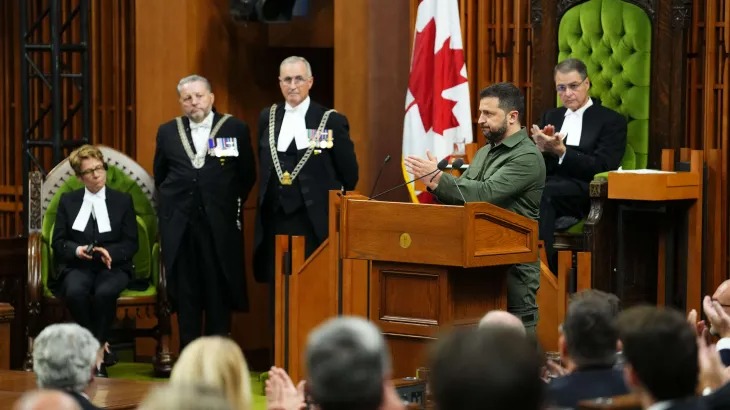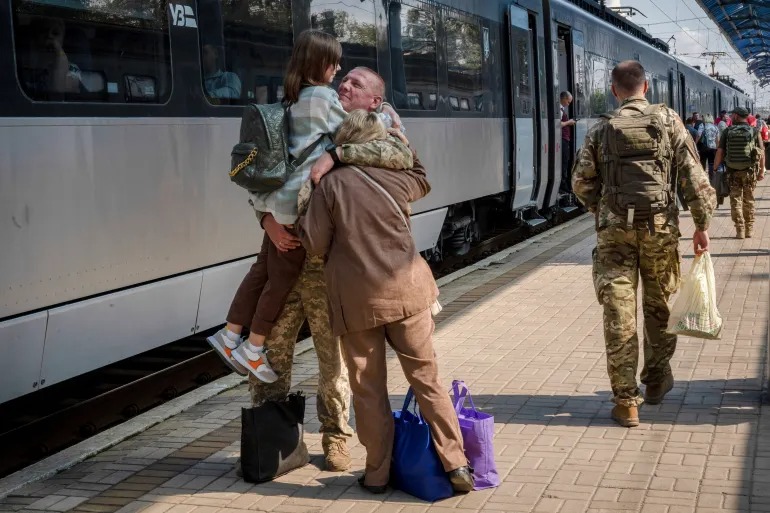In a startling turn of events at Canada’s Parliament, House Speaker Anthony Rota has been forced to issue a profound apology after he praised a 98-year-old veteran, Yaroslav Hunka, as a “Ukrainian hero” during a session attended by both Canadian Prime Minister Justin Trudeau and Ukrainian President Volodymyr Zelenskyy. The controversy arose when it was revealed that Hunka had served in a Nazi unit during World War II, triggering international outrage and calls for accountability.
Speaker of Canada’s House of Commons Faces Backlash for Praising WWII Veteran
Rota’s accolades for Hunka took place on Friday when he declared, “We thank him for all his service” while referring to Hunka as “a Ukrainian hero, a Canadian hero.” It was later disclosed that Hunka had served in the 14th Waffen Grenadier Division of the SS, a fact brought to light by the Friends of Simon Wiesenthal Center, a Jewish human rights group that demanded an immediate apology.
The center, highlighting Hunka’s documented ties to the Nazi war machine, expressed their deep concerns. During the parliament session, both President Zelenskyy and Prime Minister Trudeau joined in acknowledging Hunka with applause, inadvertently lending support to the controversial recognition.
Rota, realizing the gravity of his oversight, took full responsibility, describing it as “entirely my own.” In a statement issued on Sunday, he extended his “deepest apologies to Jewish communities in Canada and around the world.”
International Outcry as Ukrainian President and Canadian PM Attend Controversial Event
The contentious recognition occurred during President Zelenskyy’s visit to the Canadian parliament, where he thanked Canada for its assistance in Ukraine’s ongoing conflict with Russia. Rota disclosed that no one, including fellow parliamentarians or the Ukrainian delegation, was aware of his plans or remarks beforehand.
During Zelenskyy’s remarks, Hunka, seated in the gallery, received two standing ovations from those present. Canadian lawmakers cheered, and Zelenskyy raised his fist in acknowledgment while Hunka saluted.
The Friends of Simon Wiesenthal Center condemned the incident, particularly during a time of increasing anti-Semitism and Holocaust distortion. They demanded an explanation for how an individual with such a background managed to enter the halls of the Canadian parliament and receive recognition from the Speaker of the House along with a standing ovation.
Russia, in response to the controversy, has decided to send a letter to Prime Minister Trudeau and a note to the Canadian foreign ministry, demanding clarification. Dominique Arel, chair of Ukrainian studies at the University of Ottawa, called the incident “highly problematic,” emphasizing the symbolism and optics of Hunka’s association with a military unit tied to the Nazi regime.
Apology Demanded Amid Rising Anti-Semitism Concerns
As the controversy unfolds, the international community has expressed deep concern. Russia, which launched a full-scale invasion of Ukraine in February 2022, claimed its objective was to “denazify and demilitarize” its neighbor. President Zelenskyy, who is Jewish and has lost relatives in the Holocaust, disputes this claim. Kyiv and its Western allies argue that Russia’s actions amount to an unprovoked land grab, dismissing Moscow’s justification as an attempt to “manipulate international public opinion.”
CEO of B’nai Brith Canada, Michael Mostyn, labeled the parliament’s honor to a former member of a Nazi unit as outrageous. He pointed out that Ukrainian “ultranationalist ideologues” associated with the Galicia Division had advocated for an ethnically homogenous Ukrainian state and endorsed ethnic cleansing. Mostyn demanded a meaningful apology from parliament and an explanation for how such an incident could occur at the heart of Canadian democracy.
The controversy surrounding the praise of Yaroslav Hunka serves as a stark reminder of the sensitivity and importance of historical context, especially when honoring individuals with complex pasts. It remains to be seen how Canada’s government will address this international outcry and reconcile with the Jewish communities and their allies worldwide.
















